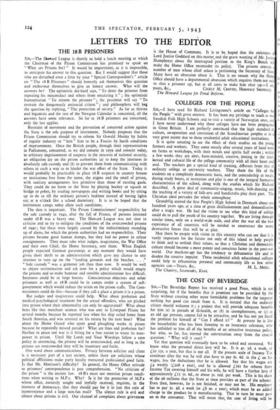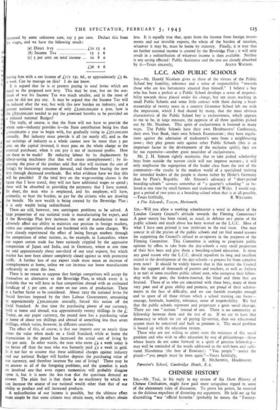THE COST OF BEVERIDGE
SIR,—The Beveridge Report has received a good Press, which is not surprising, for if The benefits that it promises can be provided by the State without creating other more formidable problems for the taxpayer nothing but good can result from it. It is natural that the ordinary citizen should welcome it ; a project that will provide adequate benefits for him (a) in periods of ill-health, or (b) in unemployment, or (c) as an old age pension, cannot fail to be attractive, and he has not yet faced the problem for himself of " Can I afford it? " At present he is like the householder who has been listening to an insurance salesman, who has unfolded to him all of the benefits of an attractive insurance policy, but who, so far, has steered the conversation away from the crucial question: " What will it cost? "
Yet that question will eventually have to be asked and answered. We know what the personal direct levy will be. It is 4s. 3d. a week, or £ro 13s. a year, but that is not all. If the present scale of Income Tax continues after the war he will also have to pay 6s. 6d. in the £ on his wages, less the deductions that he is allowed. Say that his wages are 44 weekly (,Czo8 a year), and he is allowed L161 for rebates from Income Tax covering himself and his wife, he will have a further levy of approximately £15 5s. 6d., or about 5s. rod. per week. This is his share of the 98 millions that the State at once provides as part of the scheme. Even then, however, he is not finished, or may not be. His employer has to pay 3s. 3d. a week (or £8 9s. a year), which must be an added charge to the product he is manufacturing. That in turn he must pass on to the consumer. That will mean that, the cost of living will be
increased by some unknown sum, say 5 per cent. Deduct this from his wages, and we have the following result: (a) Direct levy km 13 0
(b) Income Tarr 15 5 6 (c) 5 per cent. on total income so 8 0
£36 6 6
leaving hun with a net income of Ly-it 13s. 6d., or approximately £3 6s. a week. Can he manage on this? I do not know.
It is argued that he is at present paying in total levies which are equal to the proposed new levy. This may be true, but on the out- break of war his Income Tax was much smaller, and in the most of cases he did not pay any. It may be argued that the Income Tax will be reduced after the war, but with this new burden on industry, and a present national taxed income of only £2,000,000,000 a war, how is the L850,000,000 needed to pay the promised benefits to be provided on a reduced national Budget?
The reply, of course, is that the State will not have to provide the whole sum—industry provides it—the State contribution being less than ktoo,000,000 a year to begin with, but gradually rising to £351,000,000 annually. But industry must provide it all (or nearly all), and as the net earnings of industry as a whole cannot now be more than 5 per cent. on the capital invested, it must pass on the whole charge to the eventual purchaser, when it can pay it out of increased profits. How are these to be made? By reducing labour by its displacement by labour-saving machinery (but that will create unemployment) ; by in- creasing the price -of the product -sold (but that will increase the cost of living); by increasing consumer demand, and therefore bearing the new levy through decreased overheads. But what evidence have we that this will be possible? If the total levy on the wage-earning classes is the figure that I have stated, they will not have additional wages to spend ; these will be absorbed in providing the payments that I have, named. In short, the man who is employed, and his employer, will have, primarily, to bear the burden, to pay for the citizens who are drawing the benefit. No new wealth is being created by the Beveridge Plan ; it is only wealth being redistributed.
There are still, however, two contingent problems to be solved. A large proportion of our national trade is manufacturing for 'export, and if the Beveridge Plan levy increases the cost of manufacture it must adversely affect our ability to maintain our position in foreign markets, unless our competitors abroad are burdened with the same charges. We have .already experienced the effect of losing foreign markets through the competition of other nations, as, for example, in Lancashire, where our export cotton trade has been seriously crippled by the aggressive competition of Japan and India, and in Germany, where at one time we sold approximately about one-third of our total exports, but which market has now been almost completely closed against us with protective tariffs. A further loss of our export trade must mean an increase of unemployment at home, unless we can increase our home manufactures sufficiently to cover this .loss.
There is no reason to suppose that foreign competitors will accept for themselves an alternative to the Beveridge Plan, in which event it is probable that we wffi have to face competition abroad with an estimated handicap of 5 per cent. or more on our costs of production. There is a further factor to be considered. About 1922 the national levies for Social Services imposed by the then Labour Government, amounting to approximately £3oo,000,000 annually, forced this nation off the Gold Standard. At that time the purchasing pbwer of our currency, both at home and abroad, was approximately twenty shillings in the L. Today, on our paper currency, the pound note has a purchasing value at home of about ten shillings and abroad of something less than seven shillings, which varies, however, in different countries.
The effect of this, of course, is that our imports cost us nearly three times the value when made on a Gold Standard, while at home the depreciation in the pound has increased the actual cost of living by too per cent. In other words, the man who earns £4 a week today is no better off than the man who was formerly paid £2 a week in gold. Is it not fair to assume that these additional charges against industry and our national Budget will further depress the purchasing value of our currency, and therefore increase the cost of living? There may be an answer to all of the foregoing problems, and the question is such an involved one that even expert economists will probably disagree upon it, but it is none the less true that the questions demand an answer. The plain fact is that there Is no machinery by which we can increase the source of our national wealth other than that of our ability to produce and sell increased products.
A redistribution of our income is possible, but the ultimate effect must simply be that some citizens may obtain more, while others obtain less. It is equally true that, apart from the income from foreign invest- ments and our invisible exports, the whole of the burden of taxation, whatever it may be, must be borne by industry. Finally, it is true that no further national income is created by the Beveridge Plan ; it will only result in a redistribution of whatever income is then available. Neither is any saving effected: Public Assistance and the rest are already absorbed



























 Previous page
Previous page